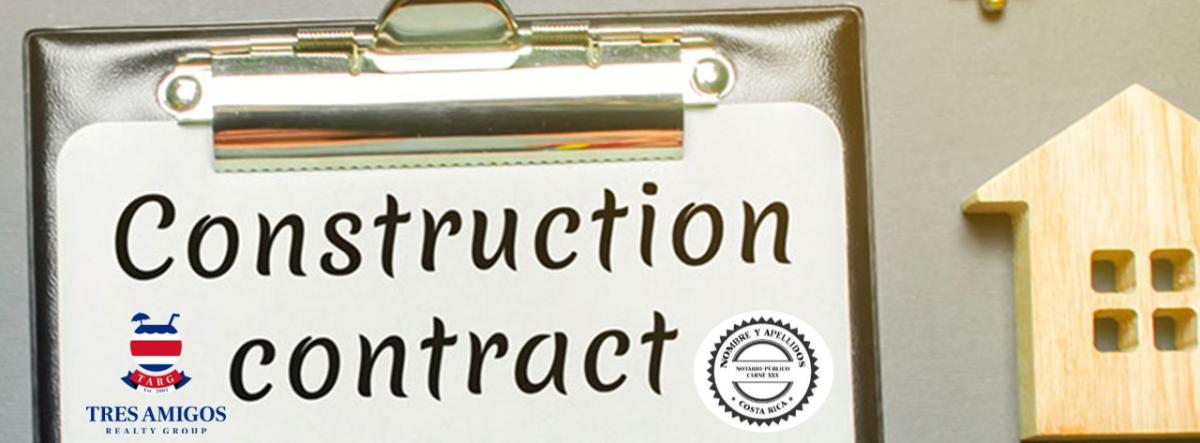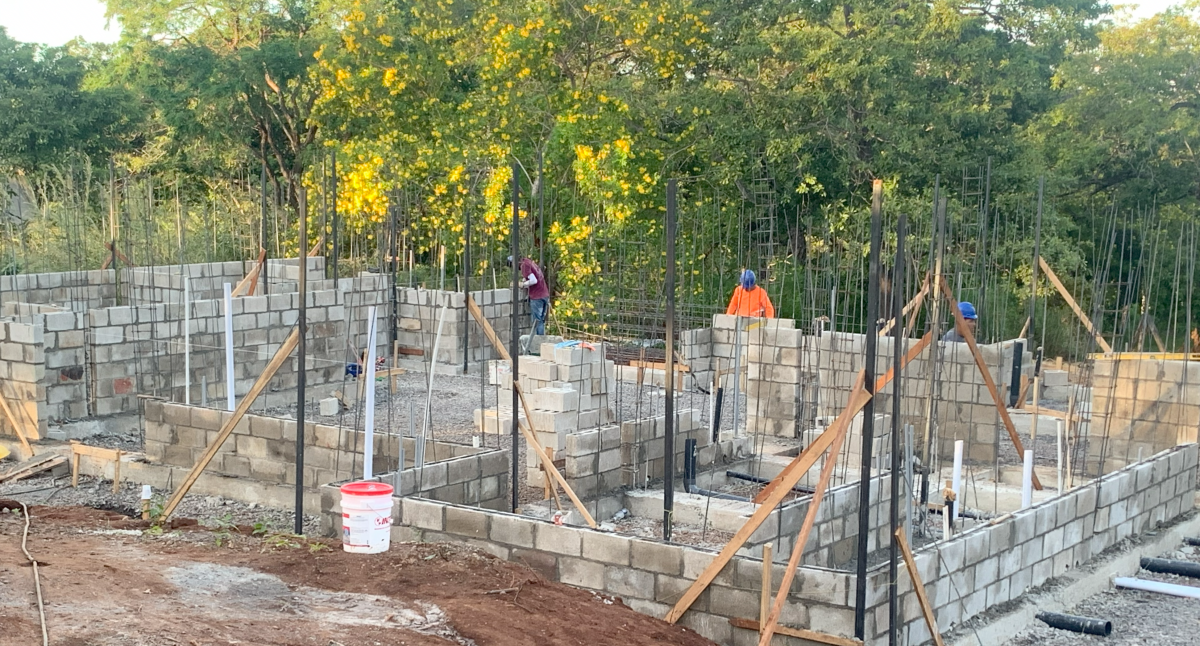Building in Costa Rica certainly does not need to be stressful.

For first time owners, start with a referral from your experienced realtor to known builder and a lawyer experienced in building contracts. Building contracts in Costa Rica follow a structured legal framework that balances the interests of both the property owner and the contractor. The legal environment is based on the Civil Code of Costa Rica, which outlines the obligations and rights of all parties involved in a construction project. As such, consultation should include, property owner(s), attorney, builder/engineer and realtor. Then all items reduced to writing in a uniform signed building contract.
Theo's Note: **In Writing.** Be sure everything is in writing, including framework for changes.
Here are some key aspects to consider in building contracts here in Costa Rica:
### 1. **Types of Contracts**
- **Lump Sum Contracts (Contrato a Precio Alzado):** This is a fixed-price contract where the contractor agrees to complete the project for a specified amount, regardless of actual costs. It is commonly used for residential and commercial construction.
- **Cost-Plus Contracts (Contrato por Administración):** The contractor is paid for the actual costs of construction plus a fixed fee or percentage. This contract provides flexibility, but costs can vary significantly.
- **Unit Price Contracts:** In this model, contractors charge per unit of work (e.g., per square meter), with adjustments depending on the scope of work.
Theo’s Note: As of 2024, Typical residential building costs for what we would consider “Class A” construction are $200+ sq ft.
### 2. **Licenses and Permits**
- **Building Permits (Permisos de Construcción):** Before any construction starts, the property owner or contractor must obtain permits from the local municipality and other regulatory bodies (such as the Colegio Federado de Ingenieros y de Arquitectos - CFIA). CFIA LINK; https://centrodeayuda.cfia.or.cr/hc/es/articles/115008056587-Partes-del-sello-APC
- **Environmental Permits (Setena):** For larger developments or projects in protected areas, additional environmental permits are required.
Theo’s Note: All building contracts include a time frame. Normally this period is 8 – 18 months. I suggest the actual construction time frame to start once the final approval of permits are received from the Municipality and shovels hit the ground. Where we sell at The Gulf of Papagayo in the Municipality of Carrillio, the boom in construction has delayed the permit process.
### 3. **Payment Terms**
- Payments are often agreed in either **Costa Rican colones (CRC)** or **US dollars (USD)**, depending on the preferences of the parties involved.
- Contracts typically include a payment schedule based on milestones or stages of the project (e.g., foundation, framing, roofing, completion).
- It's common to have an initial down payment (10-30% of the total cost), with subsequent payments made as the project progresses.
- Retention clauses may also apply, allowing the property owner to hold back a percentage of the final payment until all work is satisfactorily completed.
Theo’s Note: All expenses the builder pays including building permits, labour and materials are paid in Costa Rican Colone. The contract should stipulate a remedy for variances in exchange rates. My experience with clients building in Guanacaste lend me to prefer the building contract to be in Colone, not dollars. This arrangement eliminates the possibility of the builder trying to recoup lost revenue due to exchange rates at the expense of the construction quality.
### 4. **Labor and Employment** 
- **Labor Laws:** All workers must be employed under the Costa Rican Labor Code, which guarantees social security benefits, health insurance, and proper wage payment. Contractors are responsible for complying with these laws.
- **Local Workforce:** Preference is usually given to local labor unless highly specialized skills are required, in which case foreign workers may be hired but need proper permits and work visas.
Theo’s Note: Ask for proof of payment with regard to employee benefits and insurance. This is something to have your attorney double check before final payment.
### 5. **Warranties and Defects Liability**
- Costa Rican law typically requires a contractor to provide a warranty for structural defects, usually for a period of five years.
- Other parts of the project (such as electrical or plumbing installations) may have shorter warranties (e.g., one to two years).
### 6. **Dispute Resolution**
- Contracts may specify arbitration or mediation to handle disputes. The use of arbitration is common to avoid lengthy court procedures.
### 7. **Taxes**
- VAT (Value Added Tax or **IVA**) applies to construction services and is currently 13%.
- Builders can register for limited exemptions to VAT or **IVA**. This may effect the tax calculations for future, Value Added Tax, Income Tax and/or Capital Gains. Keep accurate records for your Costa Rican Accountant.
- Capital Gains Tax may or may not apply when selling your property (See our blog on Capital Gains Taxes). Expenses in the construction and materials qualify as expense in this calculation only if an electronic factura (Electronic Receipt) has been issued proving payment of VAT. Any material purchases made outside of Costa Rica without corresponding D.U.A. (Declaración Única Aduanera or Customs Declaration Form), are not eligible. Cash payments for services attained with no electronic factura equally do not qualify.
Theo’s Note: In Costa Rica we use a simple solution to track all business or building expenses. For each building project (or business) we create an email account. Electronic facturas are issued to that particular account. In the case of a property or project being owned by a corporation, information on the factura will include, corporate name, corporate ID number, address, email, phone number. Many of us create a business card containing this information. Mine is taped to the back of a business card. I also carry a photo on my phone. Ask for the electronic factura at time of payment. Should you want to track all purchases, including cash or non documented purchases. Simply take a photo of the receipt and email it to the corresponding email address for the property. Its always nice to have everything on a spreadsheet for your self and your accountant when tax time comes.
### 8. **Insurance**
- Contractors are often required to carry insurance to cover workplace accidents, damages, and third-party liabilities. Property owners should verify that the contractor has adequate coverage before starting work.
### 9. **Architect and Engineer Oversight** 
- The involvement of licensed architects or engineers is mandatory. These professionals must be registered with the CFIA and are responsible for ensuring that the construction complies with building codes and regulations.
Theo’s Note; In Costa Rica, your project engineer is responsible for ongoing building inspections. The local municipality does their site inspections as a lottery. As such the project engineer is provided with a set of plans, and inspections book from CFIA, Colegio Federado de Ingenieros y de Arquitectos (Federated College of Engineers and Architects of Costa Rica). The inspections book belongs to the owner of the project and was paid for as part of the engineering / permit process.
### 10. **Materials**
- All building materials and equipment needed to complete building projects are available in Costa Rica. Budget will dictate to some extent how far the owner wants a builder to go in procuring specific materials, equipment and trades. Keep these things in mind when finalizing particular pieces of the contract. Allow for adjustments to stay on budget. Availability can suddenly change prices to the surprise both owner and builder. A good local example here at Playa Hermosa, Playas del Coco and Ocotal Beach was the lack of ready-mix concrete trucks in 2022-23. Wait times extended 4-6 weeks, causing builders to bring loads of concrete from 1-1 1/2 hours away.
Theo's Note; Purchase ceramics and specialized finishes well in advance to secure to products you want. I suggest purchasing appliances for your new home in Costa Rica, as warranties are serviced thru the Costa Rican importer.
### 11. ** Construction Changes**
- In most building projects, changes in construction, plans or materials occur. It's common and many builders have provided a small leeway for changes. Be sure changes are reduced to writing, including extra time and cost. All changes must be signed for by both Builder and Owner.
### 12. **Termination of Contract**
- The contract should clearly outline the circumstances under which either party can terminate the agreement, including breaches of contract, delays, or financial insolvency.
Closing Thoughts;
There are many elements to the construction process and building contract. Feel free to call Theo to get started working with legal professionals, architects, and engineers essential to avoid potential disputes and ensure the project's success. Tres Amigos clients have successfully built several projects in Guanacaste starting with our referrals to reputable builders, surveyors and attorneys for your dream home.











